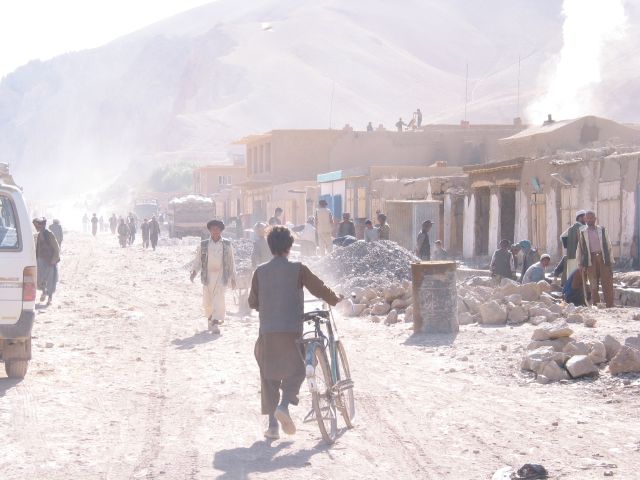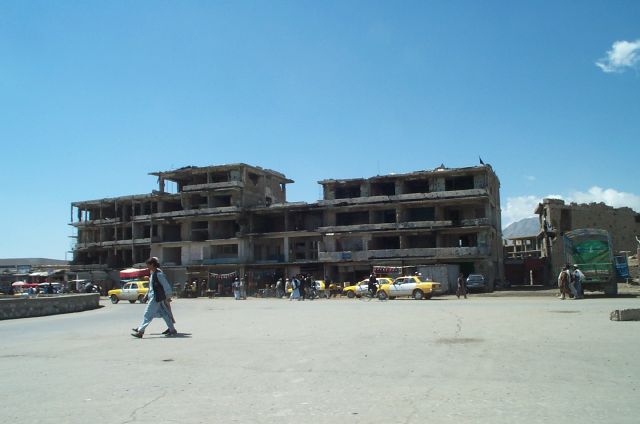On 7 October 2001, the US and UK began air attacks on Afghanistan. At that time, so soon after 11 September, there was some support for military action (1). On 7 December 2001, Kandahar, the last Taleban stronghold, fell prompting those in the West to declare the war to be won. (2).
But what was the end result of this war? Certainly Osama Bin Laden wasn't captured, though some Al-Qaeda infrastructure may have been destroyed. In the immediate aftermath of the war, it appeared that the UK and US' most obvious achievement had been the overthrowing of the Taliban - harbourers of Bin Laden, supporters of Al-Qaeda and oppressors of the local Afganistan population. So what did this mean for the people of Afghanistan?

Bande Amir: Reconstruction after the war in Yakawlang (Sep 2002)
Tony Blair said at the Labour party conference in September 2001 that "To the Afghan people, we make this commitment. We will not walk away... If the Taliban regime changes, we will work with you to make sure its successor is one that is broadbased, that unites all ethnic groups and offers some way out of the poverty that is your miserable existence." So is this what happened?
The links below may help to answer this question. In particular it is worth considering such factors as:
- The immediate legacy of war: There are serious ongoing problems with clusterbombs(3); Foreign troops continue to cause serious distress to the local population(4,5); Indirect deaths from hunger, cold and poverty have increased since the war(6), in addition to deaths caused by ongoing bombing and other violence(7,8);
- The peace on the ground: Afghanistan has been described as a `patchwork of instability'(9) with evidence that the security situation has decreased in 2003(10) to the point that `every Afghan' is affected(11); Furthermore the Taliban appears to be, once more, on the rise(12);
- The part that the UN and other NGOs are playing in Afghanistan: The UN has said that it may `have to pull out'(13) as aid workers have been targetted by violence(14); Read personal accounts from aid workers in Afghanistan(15, 16);
- The human rights situation: Amnesty has produced a report on the situation(17) while both Amnesty and Human Rights Watch continue to monitor Afghanistan(18,19); Particular problems include the history of human rights abuses which seems to dog prospective leaders of the country(20) as well as the ongoing abuses of the country's warlords(21); In addition life for women does not seem to have improved as much as had been predicted(22);
- The input and investment from foreign governments: The Afghan President has asked for massive aid from the West(23) however it seems not to have been forthcoming(24); American descriptions of their reconstruction efforts(25) seem to be undermined by a lack of foreign investment (26);
- The role of drugs in Afghanistan:After the invasion of Afghanistan, production of opium poppies leapt from 30 to 285 square miles; 95 per cent of the heroin sold on London's streets is still of Afghan origin (27); Some efforts are being made to clamp down on production by the new administration(28) but the contrast between below-subistence returns on growing food and the lure of opium profits means that this will be difficult to enforce(29);
- The path towards a viable government:A Loya Jirga, or grand council, has been set up(30) to produce a constitution for Afghanistan(31); It faces several problems, including ethnic division, claims of sexism in appointing delegates to positions of power, security threats(32) and claims of undemocratic process(33); There are concerns about the viability of lasting stable government in Afghanistan(34) and there are many powerful interests active in Afghanistan which will pose potential problems for any new government seeking to exert its authority(35).
All these links, and others, are reproduced below, grouped by source. General overviews are also included(36,37).
- From the BBC:
- [13]`Threats and fear in Kandahar' (Tuesday, 23 December, 2003)
- [12]`Who are the Taleban?' (Tuesday, 16 December, 2003)
This article claims that the Taliban refused to extradite Bin Laden, hence precipitating American military action in October 2001. These articles may shed more light on this decidedly dubious claim:- `Taliban agreed Bin Laden handover in 1998' (Monday November 5, 2001)
- `The Smoking Gun' (8 October 2001) (not a BBC source. This is an anti-war briefing using sources from the Daily Telegraph)
- `Taliban hints at bin Laden extradition (Tuesday, September 18, 2001)
- [15]`UN "may pull out of Afghanistan"' (Friday, 12 December, 2003)
- [9]`Afghanistan's slide towards chaos' (Thursday, 9 October, 2003)
- [10]`Afghanistan "out of control"' (Sunday, 10 August, 2003)
- [20]`Afghan minister rejects criticism' (Thursday, 31 July, 2003)
- [28]`Afghanistan steps up war on drugs' (Tuesday, 23 July, 2002)
- [2]`World 'safer' after Taleban surrender'(Friday, 7 December, 2001)
- From ZNet:
- Main Afghan war page MANY LINKS
- [21]`Replacing one terrorist state with another' (October 06, 2003)
- [36]`The Betrayal Of Afghanistan' (September 22, 2003) (A John Pilger article originally in The Guardian)
- [5]`The Empire's Witch Hunt' (June 26, 2003)
- [27]`Afghanistan Regains Its Title As World's Biggest Heroin Dealer' (June 22, 2003)
- [37]`Afghanistan is on the Brink of Another Disaster' (August 14, 2002) (A Robert Fisk article originally in The Independent)
- [4]` One Year On In Afghanistan '(August 05, 2002)(A Robert Fisk article)
- From The Guardian:
- From the US Government:
- [25]`Coalition Pursues Dual Missions in Afghanistan' (19 December 2003) (Department of Defense)
- `U.S., Coalition Partners Contributed to Afghanistan's Progress' (11 October 2002) (Department of State)
- From RAWA:
- Main news feed from Afghanistan MANY LINKS
- [8]`US air raid kills nine children in south Afghanistan' (December 8, 2003) (from The Independent)
- From the Pak Tribune:
- From Amnesty International:
- From Professor Marc Herold:
- From Human Right's Watch:
- From other sources:
- [16]Words from an ex-IndyMedia activist now in Afghanistan.
- Afghanistan On-line
- [29]`Opium production spreading in Afghanistan' (5 October 2003, LA Times)
- [31]Constitutional Commission Afghanistan
- [32]Afghanistan reconstruction
- [33]`US-imposed "democracy" in Afghanistan'(8 January 2004, World Socialist Web Site)
- [34]`Democracy in Afghanistan? Don't Hold Your Breath'(spring 2002, Hoover Digest)
- [35]`The Next Afghanistan'(26 May 2003, ABC News)
 Kabul, Afghanistan - bomb damage (May 2002). Photo courtesy of the Post-Conflict Assessment Unit of the United Nations Environment Programme. |
Comments
Display the following 2 comments